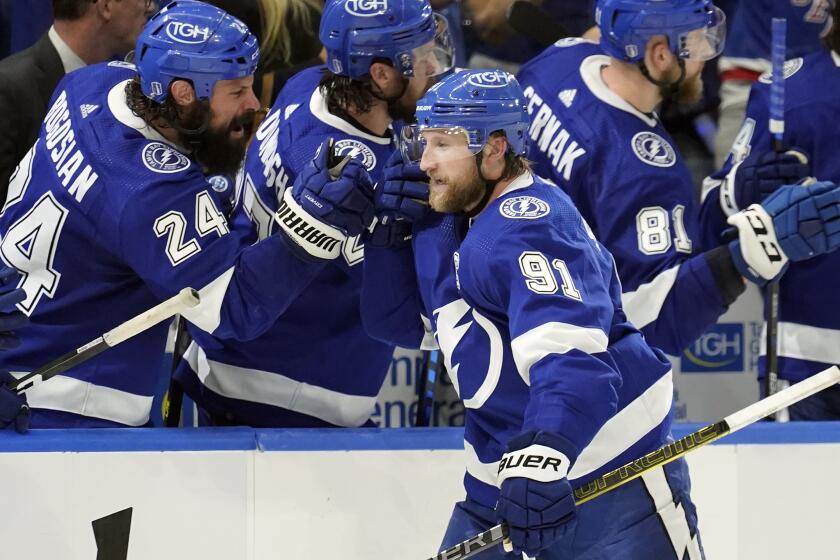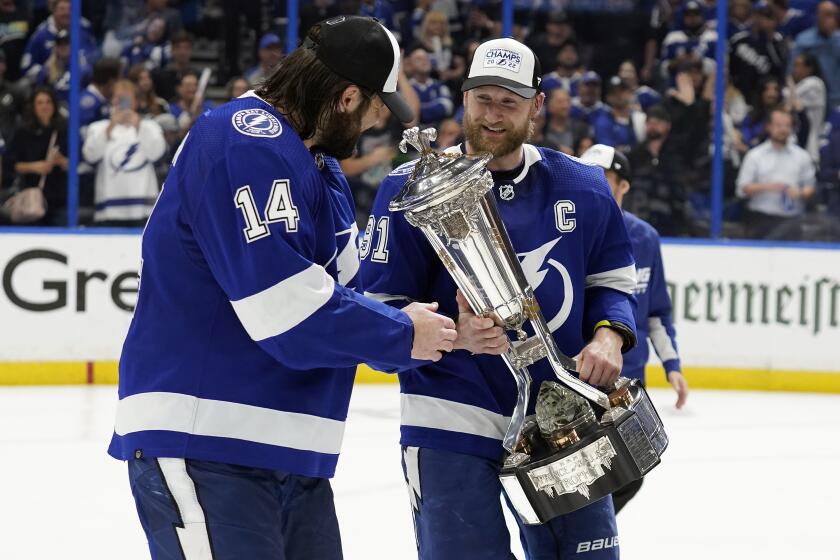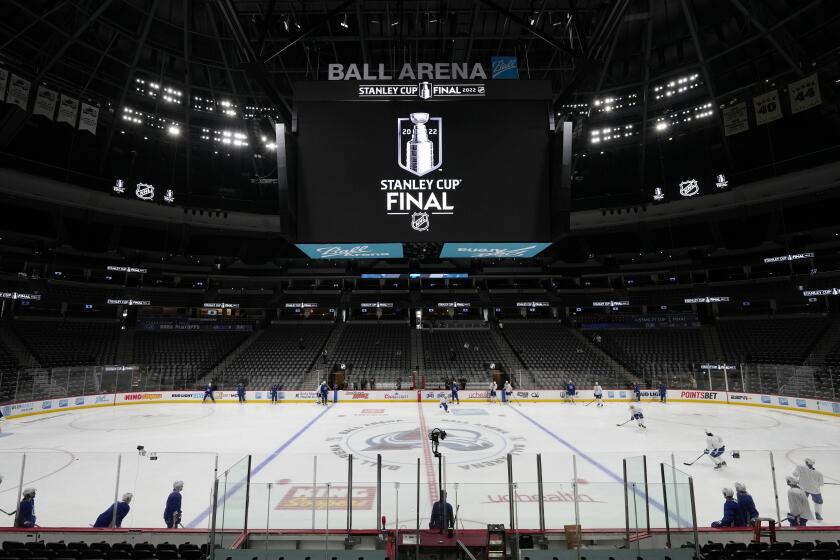Column: Kings have to like similarities with Stanley Cup finalists Avalanche, Lightning
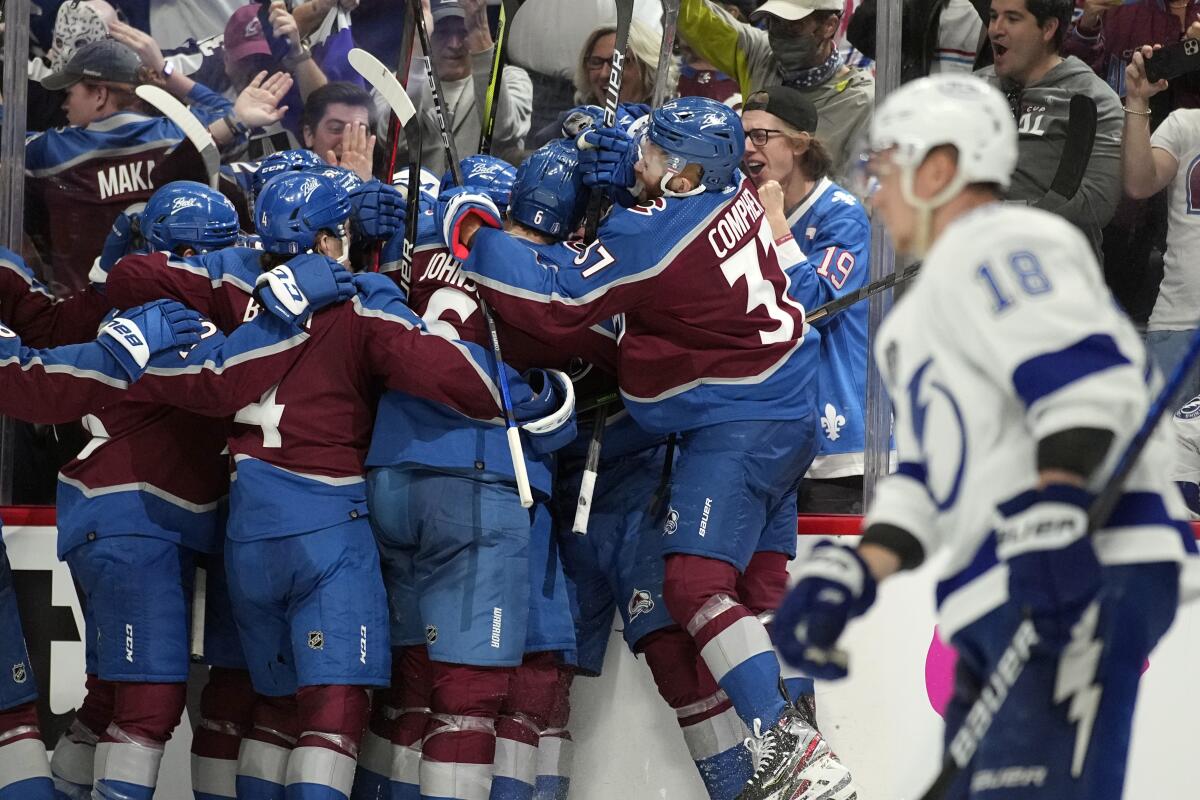
- Share via
DENVER — The Kings should be glad Colorado and Tampa Bay are in the Stanley Cup Final.
Of course, they’d rather be representing instead of the West champion Avalanche, who pushed back the Lightning’s Cup three-peat attempt by winning the opener in overtime on Wednesday on Andre Burakovsky’s slick one-timer.
But the way the Avalanche and East champion Tampa Bay constructed their rosters is similar enough to the Kings’ rebuilding strategy to encourage them they’re on the right path back to contending for the Cup again in a few years.
Colorado and Tampa Bay are built around prime draft picks they earned through years of being terrible; the Kings are trying to do the same after missing the playoffs in five of seven seasons before their seven-game loss to Edmonton last month.
Colorado, which chose Gabriel Landeskog No. 2 in 2011 and Nathan MacKinnon No. 1 in 2013, got lucky in 2017 when New Jersey, Philadelphia and Dallas passed on Cale Makar, whose mobility and creativity make him the ideal modern defenseman. Gifted defenseman Bowen Byram (No. 4 in 2019) helps make Colorado’s defense productive and exceptionally dynamic.
Tampa Bay, which chose Steven Stamkos No. 1 in 2008 (ahead of Kings defenseman Drew Doughty), Victor Hedman No. 2 in 2009, and goaltender Andrei Vasilevskiy 19th in 2012, has carried its success to later rounds. The Lightning drafted premier forwards Alex Killorn 77th in 2007, Nikita Kucherov 58th and Ondrej Palat 208th in 2011 and Brayden Point 79th in 2014.
If the Tampa Bay Lightning defeat the Avalanche for their third straight Stanley Cup title, they’ll establish one of the greatest dynasties in NHL history.
Kings picks Quinton Byfield (No. 2 in 2020), Alex Turcotte (No. 5 in 2019), Tobias Bjornfot (No. 22 in 2019) and Gabe Vilardi (No. 11 in 2017) still are developing, but the Kings showed a good eye in drafting Matt Roy in the seventh round in 2015, Mikey Anderson in the fourth round in 2017 and Jordan Spence in the fourth round in 2019.
“I think that’s where you kind of have to live in the modern NHL, especially with the salary cap, is that you have to be comfortable with being bad. And it also means being bad at the right times to get certain players,” Chris M. Peters, a longtime NHL draft and prospect analyst, said Thursday, a day off for the Avalanche and Lightning.
“The Kings have had a lot of high picks. They’ve done very well with their drafts. I think they’ve been very aggressive outside of the first round, as well. They’ve had a lot of hits outside of the first round. That’s what you need. That’s something Tampa specifically has done very well.”
Drafting early isn’t a guarantee of success. The Edmonton Oilers had four No. 1 picks in six seasons starting in 2010 but haven’t built around them.
“Rounding it out, that’s where you need to go,” said Craig Button, a draft analyst for Canada’s TSN network. “But if you’re trying to round it out without the top players in the draft, you’re not going anywhere. You’re not rounding out anything.”
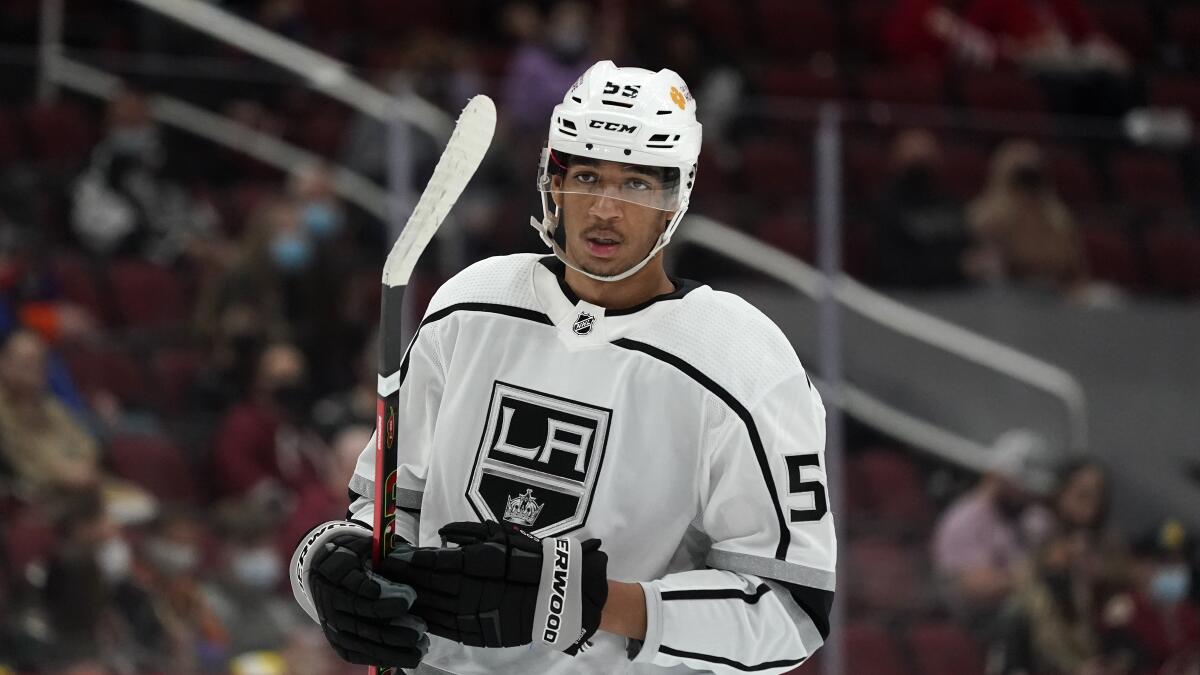
“I think L.A.’s done a fantastic job building the prospect pool.”
— Craig Button, draft analyst for Canada’s TSN network
In a salary-cap league, the draft is the only viable way to build. “You have to nail your draft picks. That’s just the way it is,” Ducks general manager Pat Verbeek, a former scouting director and assistant general manager of the Lightning, said in a recent phone conversation.
“And then OK, you can nail that down but you still have to develop them properly. You have to guard against pushing them into the NHL too soon, maybe taking that extra year to let them go back to junior or play in another league where they can still dominate but they learn how to become a pro. That’s the tricky part as well.”
Tampa Bay has excelled in development, which the Kings also prioritize. “That’s the key component for Tampa that I think is really the secret sauce of their success,” Peters said. “It’s not so much the drafting, it’s the development afterwards.”
The Kings’ top affiliate practices at the Kings’ El Segundo facility and plays in nearby Ontario, perfect for Kings general manager Rob Blake and development coaches to monitor them.
“Everything that they’ve done from the draft to the next process has been very deliberate, and I think that’s probably where they’ve taken some of the things that have made Tampa successful,” Peters said.
The Avalanche have been the best team in the NL for most of the season, but if they still have to get past two-time defending Stanley Cup champion Lightning.
Signing center Phillip Danault as a free agent last summer allowed the Kings to resist any temptation to rush Byfield to the NHL. They had progressed to a stage where it made sense for them to add quality players such as Danault and winger Viktor Arvidsson, who was acquired from salary cap-squeezed Nashville, because it took pressure off the kids and pushed the team into the playoffs without depleting their assets.
The Kings have the depth and salary cap space to trade surplus prospects and picks to fill holes in their lineup, as Colorado and Tampa Bay have done so well.
Former Kings general manager Dean Lombardi made good use of his assets to put the finishing touches to their 2012 and 2014 Cup teams, acquiring Jeff Carter for Jack Johnson in 2012 and Marian Gaborik for a prospect and two draft picks in 2014.
Colorado GM Joe Sakic did the same this year, sending prospects and picks to the Ducks for rugged defenseman Josh Manson and to Montreal for winger Artturi Lehkonen, who has seven goals and 12 points in 15 playoff games.
Tampa Bay’s Julien BriseBois, going for the three-peat, paid the hefty price of two conditional first-round picks to get forward Brandon Hagel from Chicago and sent a prospect and pick to Ottawa for forward Nick Paul.
Here’s how to watch on TV and stream the Tampa Bay Lightning vs. the Colorado Avalanche in the 2022 Stanley Cup Final, which starts Wednesday.
“I think L.A.’s done a fantastic job building the prospect pool. Even this year. You don’t have to put Quinton Byfield into a front-line role. You signed Danault. You still have [Anze] Kopitar and now Quinton can come along,” Button said. “If it works right, in my view, as Quinton gets better and Anze Kopitar gets a little bit older and Phillip does, they can move them to a little bit less ice time and Quinton can now take on a bigger role.
“Are all those players going to play for the L.A. Kings? No, they aren’t. But when you’re considering different things to improve your team, to help your current group, now you have players that are attractive to other teams and can help you right now.”
The Avalanche and Lightning will return to practice Friday to prepare for Game 2 Saturday at Ball Arena. The Kings aren’t Cup Final material yet, but Colorado and Tampa Bay are giving them reason to believe they can get there if they keep doing things right.
More to Read
Go beyond the scoreboard
Get the latest on L.A.'s teams in the daily Sports Report newsletter.
You may occasionally receive promotional content from the Los Angeles Times.

